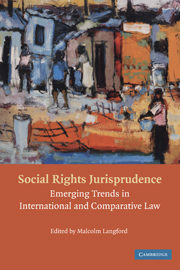Book contents
- Frontmatter
- Contents
- Foreword – Philip Alston
- Preface
- PART ONE OVERVIEW
- PART TWO SELECT NATIONAL JURISDICTIONS
- PART THREE REGIONAL PROCEDURES AND JURISPRUDENCE
- 17 African Regional Human Rights System
- 18 The Inter-American Commission on Human Rights
- 19 The Inter-American Court of Human Rights
- 20 European Court of Human Rights
- 21 The European Committee of Social Rights
- 22 European Court of Justice
- PART FOUR INTERNATIONAL HUMAN RIGHTS PROCEDURES AND JURISPRUDENCE
- PART FIVE SPECIAL TOPICS
- Notes on Contributors
- Table of Authorities
- Index
- References
19 - The Inter-American Court of Human Rights
Beyond Progressivity
Published online by Cambridge University Press: 05 June 2012
- Frontmatter
- Contents
- Foreword – Philip Alston
- Preface
- PART ONE OVERVIEW
- PART TWO SELECT NATIONAL JURISDICTIONS
- PART THREE REGIONAL PROCEDURES AND JURISPRUDENCE
- 17 African Regional Human Rights System
- 18 The Inter-American Commission on Human Rights
- 19 The Inter-American Court of Human Rights
- 20 European Court of Human Rights
- 21 The European Committee of Social Rights
- 22 European Court of Justice
- PART FOUR INTERNATIONAL HUMAN RIGHTS PROCEDURES AND JURISPRUDENCE
- PART FIVE SPECIAL TOPICS
- Notes on Contributors
- Table of Authorities
- Index
- References
Summary
INTRODUCTION AND BACKGROUND
The Inter-American Court of Human Rights was established in 1979 as ‘an autonomous judicial institution’ of the Organization of American States (‘OAS’), charged with applying and interpreting the American Convention on Human Rights, the principal human rights treaty of the region. With its seat in San José, Costa Rica, it is composed of seven part-time, independent judges nominated in their individual capacity by the States parties to the Convention and elected by secret ballot for a renewable six-year term by an absolute majority vote in the OAS General Assembly. The Court's elected judges must be jurists of the ‘highest moral authority’, of recognised competence in the field of human rights, and possess the qualifications required for the exercise of the highest judicial functions in conformity with the law of the State of which they are nationals or that proposes them as candidates.
As a ‘judicial institution’, the Inter-American Court has both contentious and advisory functions, the jurisdictional boundaries of which it closely guards. Since its inception, the Court has used both functions broadly. It has adopted nineteen advisory opinions since 1982, and adjudicated the various procedural stages (admissibility, merits, reparations, interpretation, compliance) of over seventy individual cases since its first, the renowned Velásquez Rodríguez case, was decided in 1987. Under its contentious function, the Court's judgments on liability and reparations, as well as its issuance of provisional measures, are final and not subject to appeal.
- Type
- Chapter
- Information
- Social Rights JurisprudenceEmerging Trends in International and Comparative Law, pp. 372 - 408Publisher: Cambridge University PressPrint publication year: 2009
References
- 2
- Cited by



